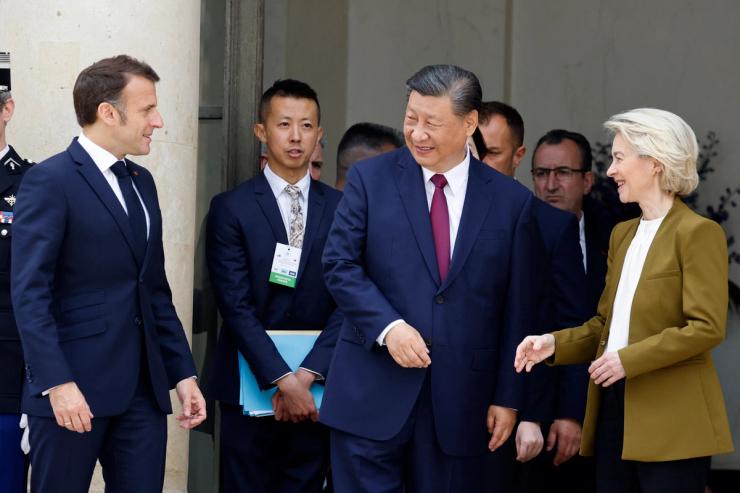The Scene
Western leaders have long held out hope that they could convince China to break with Russia over the war in Ukraine. This week, they’re once again finding themselves disappointed.
On Thursday, Chinese leader Xi Jinping is expected to use his meeting with Russian President Vladimir Putin in Beijing to cement their two countries’ “no limits” partnership and deepening military ties.
As Russia’s most important economic partner, Western governments view China as the only country capable of convincing the Kremlin to change course in its war. But Beijing has consistently brushed off pressure to intervene, including pleas during this past month by the leaders of Germany, France, and the European Union in the leadup to Putin’s visit.
Instead, China has “doubled down on their alignment with Russia,” said Bonnie Glaser, managing director of the German Marshall Fund’s Indo-Pacific Program.
“I think there is a bit of a misunderstanding about the nature of that relationship and a remarkable number of governments and experts who still think that somehow we could drive a wedge between those two countries and that we should adopt policies aimed at that goal,” Glaser said. “I just think that ship has sailed.”
Some have suggested China might join the upcoming Ukraine peace conference being held in Switzerland next month. Earlier this week, German Chancellor Olaf Scholz downplayed expectations for the conference, but said he was working to ensure China would attend.
Asked about the conference, a spokesman for the Chinese embassy in Washington was noncommittal.
“We have been committed to promoting talks for peace and political settlement of the crisis,” embassy spokesman Liu Pengyu said. “China supports the holding in due course of an international peace conference that is recognized by both Russia and Ukraine and ensures the equal participation of all parties and fair discussions on all peace plans.”
The Russians are not invited to the Switzerland conference and Moscow has dismissed the plans.
“We are open to a dialogue on Ukraine, but such negotiations must take into account the interests of all countries involved in the conflict, including ours,” Putin told Chinese state media on Wednesday ahead of his trip.
In this article:
Morgan’s view
At this stage, it’s hard to see a scenario in which China suddenly changes tack on Ukraine.
Officially, China has tried to remain neutral on the war and said it supports peace. But it has buoyed Russia’s economy by maintaining trade relations in the face of Western sanctions, including by buying oil. Chinese companies have continued selling civilian tech to Russia that can be adapted for military purposes, according to US and European officials, whose governments have imposed penalties on companies in China and warned of more.
Meanwhile, China and Russia have ramped up military exercises in Asia. Recently, a top US intelligence official testified that the Chinese and Russian militaries are cooperating more closely on Taiwan, which Beijing claims as its own territory and may seek to take over in the coming years.
US officials have also cast doubt on China’s comments about seeking peace.
“We’d welcome the participation of China or any other nation that wanted to get involved to help find an end to this war that accommodates and is respectful of President [Volodymyr] Zelenskyy’s 10-point plan for a just peace,” White House national security spokesman John Kirby told me recently. “I’d be remiss, though, if I told you we’d actually seen China move in that direction. We just haven’t.”
Glaser argued that European governments are more apt to believe that China might actually be persuadable than the US. “There is no naivete in the US government about the China-Russia relationship,” she told me.
During a recent trip to Washington, Czech Prime Minister Petr Fiala suggested Beijing may not want Russia to win the war. For China, it is an “advantage if Russia is strong but dependent on China,” he told a group of journalists. The country’s president has since warned that Beijing is benefiting too much from the war to serve as a peacemaker.
Some analysts also believe that China benefits from the war continuing on.
“It keeps America and Europe distracted,” said national security expert Dmitri Alperovitch, who is the cofounder and chairman of the bipartisan nonprofit Silverado Policy Accelerator. “By and large, this war has been fairly good to China.”
Pavlo Verkhniatskyi, a member of the Yermak-McFaul Russia sanctions group, also told me that China lacks incentives to help wind down the war. “A weakened and sanctioned Russia is something China benefits from while getting hydrocarbons at a privileged price and dictating other trade terms,” he said.
Room for Disagreement
Some officials and analysts cite China’s warnings about nuclear weapons use as a sign that Beijing is, in fact, willing to push Russia. They also point out that China has appeared to refrain from supplying the Kremlin with actual weapons.
“We’ve seen the Chinese use that influence,” said former US Ambassador to Ukraine William Taylor, who noted that Chinese officials attended Ukraine peace talks in Saudi Arabia last year.
China also risks economic blowback from the US and Europe — with which it is still tightly intertwined — as well as the adverse economic effects of a prolonged conflict. Some Chinese banks have reportedly cut off or slowed down their transactions with Russian financial institutions out of fear over secondary sanctions.
“China is basically supporting Russia in this war,” NATO Deputy Secretary General Mircea Geoană said in an interview last month. “This is prolonging the war, this is not good for the world economy, and ultimately even if tactically they could be interested in seeing Russia punching and creating difficulties for America or for the West, if you draw the line in broad strategic global considerations, this is not a winning proposition. And this is something that we hope also that Beijing will realize sooner rather than later.”
Notable
- Ukraine has relied in part on drones made by Chinese suppliers, but the New York Times wrote last year that Chinese companies had cut back sales of drones and components.
- Putin’s trip to China demonstrates that US threats of sanctions may be “wishful thinking,” Alexandra Prokopenko writes in the Financial Times.


